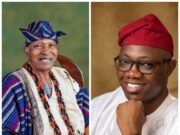On Tuesday, students of The Polytechnic, Ibadan, Oyo State, protested the renaming of their school after the recently deceased ex-governor of the state, Dr Omololu Olunloyo. Earlier, the officials of the Student Union Government in the school wrote to the House of Assembly to appeal for a reconsideration of the renaming of the polytechnic by Governor Seyi Makinde. They feared renaming their school would erode its brand identity along with the values it carries. The problematic situation that re-naming a school after a dead politician kick-starts is not unprecedented. When former president Dr Goodluck Jonathan also tried to rename the University of Lagos after the late Chief Moshood Abiola, the students too resisted the move so fervently that the government had to back down. What should have become an act of honour dishonoured the memory of the dead, a fault of our leaders who failed to read the room.
Makinde should have known better than to repeat the mistake of attracting disrespect for the dead in the name of honouring them. Understandably, the students (and alumni) are protesting the unilateral decision to rename their school. Renaming a street or market after someone is not the same as for an academic institution. The stakes are different, and an institution that has acquired a name, character, and prestige faces the setback of abruptly building a new image. To re-name an academic institution after someone is to co-opt its accrued character, value, and prestige and endow them on that individual (and vice versa). The larger society benefits from this institutionalisation of values.
There are two problems I espy with the governor overlooking the history of a community pushing back at renaming a school that has made a name for itself. One is that the Nigerian government characteristically does not consider the feelings of the public (unless, of course, such an emotional surge directly affects the outcome of an election). Makinde knew there would be protests, but he must have shrugged them off. Like a typical politician, he knows Nigerians are given to short-term rage. We vent, but we also famously adapt. If you can ride out an outrage for a few days (or at most, weeks), you will get away with anything in Nigeria. While people might eventually resign to the decision, it is pertinent to ask where the honour is for the dead? Of what practical use is a commemorative act that the community does not want to reinforce? Without an emotional or ethical, or functional bond with the community that is supposed to take the value being honoured forward, is the whole affair not robbed of meaning?
Which brings me to the second issue. In our society, the acts of renaming institutions or landmarks after people monumentalise vanity. We hardly honour heroes in this part of the world and are far less practised in the art of celebrating those who make meaningful achievements that uplift the collective. Instead, we over-recognise those whose greatest contribution is to plumb new depths in corrupting social ethics. Thus, the skills a society builds from honouring inspirational individuals are oriented towards the political class, who have done nothing significant other than eroding our collective will. Rather than thoughtful acts of honour, they are barely more than idolatrous genuflections by politicians who want to seem as if they are doing something but can hardly be bothered to put in some rigour into the exercise.
In the past few weeks, much has been said about the spate of renaming of public buildings in supposed honour of the sitting President Bola Tinubu. Within a mere two years, nine different landmarks and buildings have been renamed after him. As if that is not enough, there is also a Bola Ahmed Tinubu Federal University of Nigerian Languages in the works. The desperation to splash the Tinubu name everywhere makes you wonder, ‘Are these re-namers so consumed with their sekárími politics that they forget that these acts of honour must at least have some meaning?’ This man is only halfway into his first term, and the entire political establishment cannot seem to do enough to gratify his ego. Must they publicly ridicule him by playing to his insecurities? If everyone around the President has to act as if he has established a legacy worth memorialising in just 24 months, there is a 99 per cent chance they are merely overhyping a tenure that is pretty much forgettable (and will, in fact, be mostly forgotten as soon as ‘Dear Leader’ makes his exit).
The way we do political honour in Nigeria hardly ever seeks to inspire another generation to greatness; it is mostly to stroke egos. That is why much of the effort is never more than tawdrily slapping a name on buildings/landmarks to project an idea of indelibility of achievement in leadership and public service. The haste with which they do these things speaks to the disjuncture between the impact of the legacy being supposedly honoured and reality. Renaming so many places after a man who has yet to achieve anything significant in office is an expression of fear that the vapidity of his leadership will dissipate in the transience of political power, and the public must be forcibly oriented to put off this inevitable fate.
Listen to the FCT Minister Nyesom Wike’s justification for renaming the International Conference after Tinubu, and it is not hard to tell that this is mere brownnosing. He is not alone. None of the people who have “honoured” Tinubu by naming one thing or the other after him has managed to articulate a coherent thought on how they believe the honour will inspire us to greater causes, project humanistic ideals, or even bequeath a worthwhile legacy. The best they come up with is how Tinubu is some graven image before whom every knee must bow. It is a desperate effort to subsume the character of a public space under an individual’s ego.
Frankly, our society needs to move beyond this act of co-opting public places to endow individuals with honour without really thinking about what it means.
Let me put it on record that I commend Makinde for at least promising to digitise the late Olunloyo’s library, and I hope he sees that through. However, renaming the polytechnic after him has no value for his memory. Makinde would have done better for the man’s memory by establishing something like a maths institute within that polytechnic in his name. Such an institute would be tasked with recruiting visionary individuals and setting them to task to create the resources to identify, build, and promote specially gifted mathematicians among us, who will go farther in honouring the memory of the man.
Such an institute can also provide educational resources to promote mathematical learning since many students struggle with the subject. That would have been a more befitting honour for a man whom almost everyone I know and have read agrees was a brilliant mind. Virtually everyone speaks of Olunloyo’s mathematical genius and the many prospects he embodied. We do not need to waste time addressing what he did not achieve despite his potential, nor do we need to accompany him with any regrets. However, as a society, we owe it to ourselves to invest efforts in identifying the emergent gifted and the talented among us and giving them a platform to flourish. An institute like that would not only represent his life, but it would also have meaning within society. Even better, that would be a real honour.


































